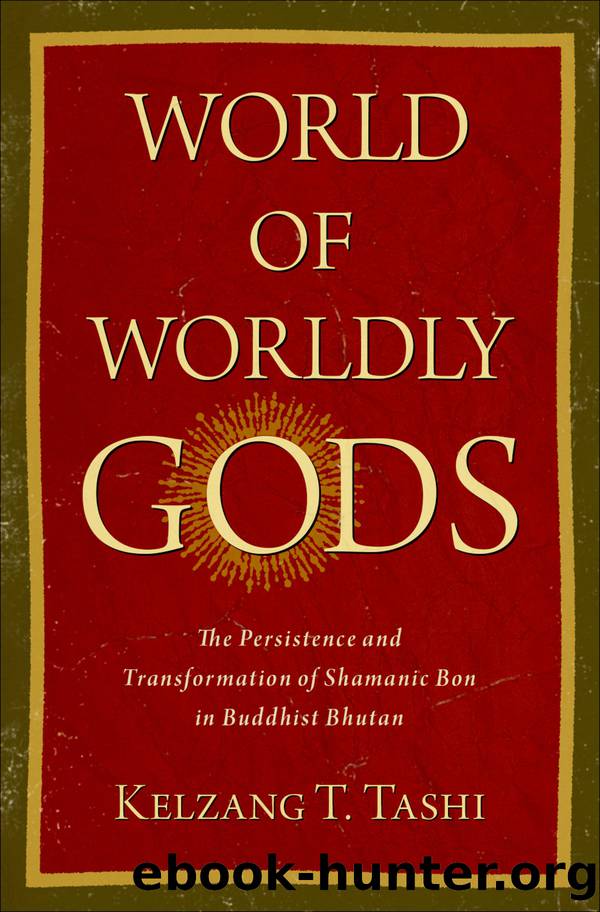World of Worldly Gods by Kelzang T. Tashi

Author:Kelzang T. Tashi
Language: eng
Format: epub
Publisher: Oxford University Press
Published: 2023-08-15T00:00:00+00:00
Signed by the Judge of the Zhemgang District
Different Bonpos were summoned several times to appear in court in different time periods, but the court never passed a formal decree. However, in this final case, which involved four Bonpos and one lay chöpa in a cow sacrifice to Shartsen deities, the legally binding letter of agreement where the Bonpos unanimously vowed not to perform any Bon rituals and divinations was issued. Their pledge of commitment as the law requires is attested to by their individual thumbprint and the drinking of holy water bound by a promise (nachu). Bonpo Chungla was nominated as the first official village Bonpo by the court, but there were no clear by-laws to regulate the election of his successor.
It should be clear that the evidence presented thus far suggests that live-animal sacrifices and black magic rituals are the two primary Bon practices that give impetus to current Buddhist antagonism, leading up to the formal recognition of general Bonpos while prohibiting others, including the specialist Bonpos. The appointment of an official Bon priest is also in part the powers of specialist Bonpos, given that the lay chöpas themselves are not completely immune from black magic rituals. The lay chöpas can equally fall under the powerful Bonpoâs subjection, as attested by many narratives about black magic rituals that have claimed the lives of Buddhist masters. Nonetheless, through such interventions, the Buddhists create what Foucault (1975) calls âdocile bodiesâ to control the powerful Bonpos, while at the same time perpetuating Buddhist hegemony over Bon under the veneer of a civilizing Buddhist mission.
Although a handful of Bon gods and deities were subjugated and converted to Buddhism, Buddhists did not eliminate the Bonpos, nor did they render Bonpos nugatory or godless given the fact that the number of untamed Bon gods and deities is far larger than those who are considered to be tamed. In fact, it seems that the Buddhists were interested in incorporating only powerful Bon gods while disdaining the lesser autochthonous beings. In this sense, there are actually no specific Buddhist remedies against the sicknesses believed to be caused by the untamed local deities and spirits who are commonly associated with abducting souls. The Golengpa Bonpos maintain that the untamed local deities are more willing to cooperate with the local Bonpos, who have been living and dealing with them for years, than the higher Buddhist priests from other districts. While there are Buddhist parallels oriented toward buying back the abducted soul (lalu), they were not as popular as the shamanic ritual given the recency of and weakness of the Buddhist presence in Goleng. Furthermore, it is the Bonpos who know the precise cause or the spirit beings behind the sickness because of their knowledge of, and a close affinity with, the local pantheon, and thus they can administer appropriate rituals for the sick person.
Switching between Buddhist and Bon rituals, particularly by a Buddhist monk in Bumthang, indicates that Bon beliefs are not just important to villagers alone but also
Download
This site does not store any files on its server. We only index and link to content provided by other sites. Please contact the content providers to delete copyright contents if any and email us, we'll remove relevant links or contents immediately.
Phoenicians among Others: Why Migrants Mattered in the Ancient Mediterranean by Denise Demetriou(595)
american english file 1 student book 3rd edition by Unknown(585)
Verus Israel: Study of the Relations Between Christians and Jews in the Roman Empire, AD 135-425 by Marcel Simon(584)
Caesar Rules: The Emperor in the Changing Roman World (c. 50 BC â AD 565) by Olivier Hekster(568)
Basic japanese A grammar and workbook by Unknown(551)
Europe, Strategy and Armed Forces by Sven Biscop Jo Coelmont(511)
Give Me Liberty, Seventh Edition by Foner Eric & DuVal Kathleen & McGirr Lisa(488)
Banned in the U.S.A. : A Reference Guide to Book Censorship in Schools and Public Libraries by Herbert N. Foerstel(479)
The Roman World 44 BC-AD 180 by Martin Goodman(469)
Reading Colonial Japan by Mason Michele;Lee Helen;(462)
DS001-THE MAN OF BRONZE by J.R.A(456)
The Dangerous Life and Ideas of Diogenes the Cynic by Jean-Manuel Roubineau(449)
Introducing Christian Ethics by Samuel Wells and Ben Quash with Rebekah Eklund(446)
The Oxford History of World War II by Richard Overy(444)
Imperial Rome AD 193 - 284 by Ando Clifford(443)
Catiline by Henrik Ibsen--Delphi Classics (Illustrated) by Henrik Ibsen(412)
Literary Mathematics by Michael Gavin;(406)
Language Hacking Mandarin by Benny Lewis & Dr. Licheng Gu(399)
Brand by Henrik Ibsen--Delphi Classics (Illustrated) by Henrik Ibsen(376)
